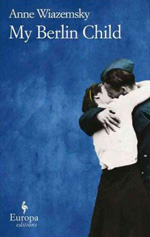

Europa Editions, paperback, 9781609450038
When I saw the beautiful cover of this Europa Edition novel, I immediately stopped and read the flaps. The story sounded like something I would love: a female ambulance driver in WWII, with a minor role in the Résistance, ultimately finds love in post-war Berlin. The crowning allurement was that it was based on a true story. I couldn't wait to begin.
My Berlin Child has all the elements of a great fictionalized memoir. The heroine, Claire, is the daughter of the author François Mauriac, and the book is written by her daughter, an acclaimed author in her own right. In the story, Claire struggles to define her identity and separate herself from her father's fame and her family's wealth and connections, while simultaneously unable to deny herself the pleasure of wearing the pin given her by de Gaulle or to escape her class prejudices. Rebellion leads Claire to be reckless in her work as a French Red Cross ambulance driver, and sometime accomplice to the Résistance, but she remains immune to patriotic fervor. Emotionally flat, she seems only superficially affected by the suffering she witnesses.
Much of the book is given to Claire's love life, and her relationships are plagued by the same ennui and emotional immaturity that colors her efforts in the war. As the book begins, she is engaged to Patrice:
In the meantime, there is her lover in Béziers; the memories of Jock, whom she may have loved and who was killed in Cassino; André, who was most likely tortured by the Gestapo, but never gives up her name. It is only in Berlin, when she meets a young Russian émigré to France, that she begins to display more understanding and maturity.
But along with this new self-awareness are the lingering prejudices of her class: "Do you have any idea just what is at stake in a marriage between a French girl from a good family and a Russian ex-prince who lost his entire fortune because of a revolution?" she asks her friends.
As Claire navigated life in post-war Berlin and this new relationship, I kept waiting for the epiphany when Claire would
become heroic or at least become a mature, self-reflective woman. Instead, however, Claire remains fairly self-absorbed, and
it made me wonder if the author was writing in a style meant to downplay her mother's strengths. Or perhaps Anne and her
mother were estranged? I was disappointed at how little we learn about Claire's work with the French Red Cross and about
life in post-war Berlin. My Berlin Child will be of interest mainly to those curious about a famous woman's WWII experiences or
to those, like myself, who read compulsively on the war.
